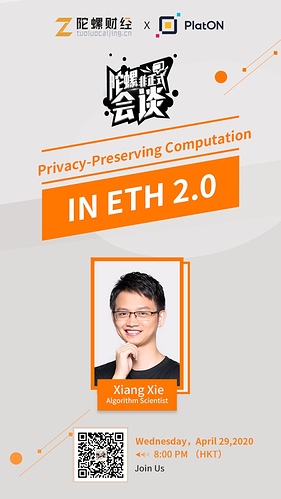On Apr.29, 2020, PlatON Algorithm Scientist Dr.Xiang Xie, invited as the guest speaker by tuoluocaijing.cn, talked about the technology upgrade, and the implementation of privacy-preserving computation on ETH2.0, and the market status and prospect of privacy-preserving computation as well.
Details about the Technology Upgrade of ETH2.0
Dr. Xie: There are four stages in Ethereum’s road map: Frontier, Homestead Metropolis and Serenity, and currently Ethereum has entered into Serenity, namely ETH2.0.
ETH2.0 consists of phase0, phase 1 and phase 2, and mainly addresses the sustainability and scalability issues on Ethereum. By doing so, Ethereum could transferred to be PoS-based network from PoW-based network, where everyone can easily be a validator of Ethereum and win block production reward by staking 32 ETH. Besides, the low TPS could be greatly improved with Sharding to support more applications.
The collaboration between Ethereum and PlatON is to solve the data availability of Sharding proposal, and the design and implementation of PoC (Proof of Custody) with MPC.
Introduction of PoC Proposal and MPC
Dr. Xie: PoC, abbreviated from Proof of Custody, asked every validator to deliver a proof when producing a block to ensure that he owns the data of the new produced block. If the validator lies, it will be reported by other validators and get punished accordingly.
To generate a PoC proof, the private key of validator is necessary. Realizing PoC using MPC is just one way to manage the private key while reducing the potential risks of asset slash caused by private key disclosure.
Besides, through MPC, the trustless validator pool can be created to reduce the staking amount for each single validator, while bringing in new potential staking model.
Design and Implementation of MPC on PoC
Dr. Xie: Ethereum is designed to be crypto-friendly from the very beginning, as cryptography can help address many limits. MPC is an algorithm based on secret sharing.
Every validator’s private key will be separated and kept by multiple parties, and by no means be disclosed as a complete private key. When being required to generate the PoC proof, all the parties will join force to finish the work. That is to say, all users manage a distributed validator together.
Currently, we’ve finished the design and implementation of PoC in phase 1 for ETH2.0 with MPC, and made it open-source on Github. Furthermore, we’ve finished the intensive test of PoC on over 20 nodes located in Tokyo, Singapore, Bombay, Sydney and Frankfurt. We can generate a proof in around 3s under 8G RAM/100Mbps, which definitely meets the requirement that the time duration should be less than 12s. And we are planning on keeping improving the performance.
It Seems that Seldom Do Chinese Projects Get Involved in the Construction of ETH2.0, Can You Share What the Chance to Facilitate the Collaboration between Ethereum and PlatON Is?
Dr. Xie: To be honest, Dr.Xiao, founder of PlatON, is an early investor of Ethereum. PlatON team has communicated with Ethereum for a long period of time, and have deep technical talks with Vitalilk and Ethereum Foundation researchers, and then settled the collaboration after 2 years.
It takes time to make the collaboration direction and content clear, we just reached an agreement on that cryptography can do something different and meaningful for Ethereum, including voting, privacy contract for auction, etc. Finally, with a deep communication with Dankrad Feist, an Ethereum Foundation Researcher who is responsible for the design of PoC, we determined that we could collaborate on the design and implementation of PoC with MPC. Thanks very much for Dankrad’s sharing and suggestion on the implementation and improvement of MPC.
Does Ethereum Value Privacy-Preserving Computation More Compared to Other Projects? What ’ s the Relationship between Ethereum/ETH2.0 with Privacy-Preserving Computation?
Dr.Xie: Seen from the moves of Ethereum, it’s easy to find that Ethereum values privacy more and more. I think it’s a must for Ethereum to become the World Computer.
As Ethereum becomes more and more influential, different industries start their attempts of businesses and applications on Ethereum, and there will be more emerging businesses and industries transferred to Ethereum ecosystem. Huge data will be generated undoubtedly, and privacy must be the most concern to all industries and users. Thus, privacy-preserving computation is a must.
Actually, many technical problems on Ethereum are solved by cryptography, such as the MPC implementation for PoC, privacy trading based on ZKP, and the zk-rollup improvement of layer 2 using ZKP.
When Will ETH 2.0 Apply the Implementation of MPC on PoC That PlatON Team Finished?
Dr. Xie: PoC is planned to be launched in phase 1. Our implementation of MPC on PoC provides a implementation of distributed validator.

